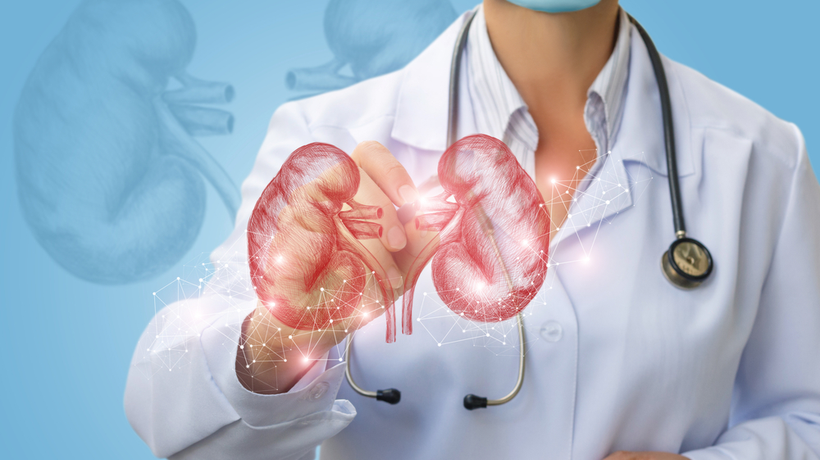Your kidneys are an important function of your body. They filter waste products, excess water, and other impurities from your blood and these waste products are stored in your bladder and later expelled through urine, according to Justin Choi, M.D. Your kidneys also have other functions like regulate pH, salt, and potassium levels in your body, and are responsible for activating a form of vitamin D that helps your body absorb calcium. That is why maintaining kidney health is important, here are some ways that you can do that.
Stay Hydrated
Water is important for the function of your body, so trying to drink eight glasses of water a day is a great goal to maintain. Consistent intake of water will help keep your kidneys healthy. According to Choi, it helps clear sodium and toxins from your kidneys and lowers your risk of chronic kidney disease. It is best to try and have at least 1.5 to 2 liters of water in a day but the amount you may need can depend on your health and lifestyle, says Choi.
Don’t Smoke and Limit Alcohol Consumption
Putting limits on smoking and drinking will help your body overall, but it will benefit your kidney health as well. According to the National Health Service (NHS), they recommend stopping smoking completely and advise drinking no more than 14 units of alcohol a week on a regular basis. This is because drinking too much alcohol and smoking raises your blood pressure. And high blood pressure is one of the most common causes of kidney disease, says NHS.
Reduce Your Salt Intake
Based on research done in 2018 for the Journal of Clinical Hypertension, showed that eating too much salt can directly lead to kidney disease. This is due to salt upsetting the balance in your blood, making your kidneys work harder to remove water from your body, says author Milliam Murigi. It is recommended to limit your sodium intake to one teaspoon per day.
Eat Plenty of Vegetables
Vegetables should be an important part of your diet because they have many nutritional factors that will be beneficial for your kidneys and overall health. According to the National Kidney Foundation, it is important to have vegetables in your diet but also trying to cut back on eating meat. This is because eating an excess of animal protein can cause issues for your kidneys, such as kidney stones.
Exercise Regularly
Having a daily exercise routine will help you and your kidneys stay healthy. Regular physical activity can help with weight loss and lower your blood pressure, which are factors that can affect your kidney health. Do not try to do too much at once because “overexerting yourself when you’re not in good shape can lead to serious problems, especially if you are at high risk for heart disease,” says James Simons, M.D. Considering your conditions, be sure to begin an exercise routine that suits your level and progress from there.
Maintain a Healthy Weight
Maintaining your body healthy inside and out is important for your kidney health. According to the National Kidney Foundation, keeping your body at a healthy weight takes away excess strain on your kidneys. Regularly exercising and eating right will make this less difficult to achieve. It is recommended by the NHS to aim for at least 150 minutes of moderate-intensity exercise, like walking, cycling, or swimming, every week.
Monitor Your Blood Pressure
High blood pressure can become a cause for future kidney damage. Choi explains that a healthy blood pressure reading is 120/80 and prehypertension is between that point and 139/89. To maintain a healthy blood pressure level, it is important to stay active and have a well-balanced diet. If your blood pressure readings are consistently above 140/90, Choi recommends talking to your doctor about monitoring it, making changes in your lifestyle, and possibly taking medication.
Be Cautious of How Much Medication You Take
According to Choi, if you regularly take over-the-counter pain medication, you may be causing kidney damage. If you take nonsteroidal anti-inflammatory drugs, like ibuprofen and naproxen, regularly it can be causing damage to your kidneys. Using them daily can be hard on your kidneys, and have even been linked to kidney cancer, according to the National Kidney Foundation. Try finding other remedies to relieve your chronic pain, headaches, or arthritis. If the pain does not stop and you regularly need over-the-counter medication, it is recommended to visit your doctor about the issue.



